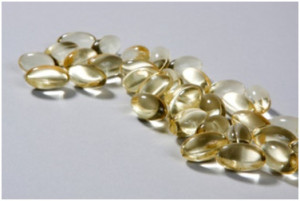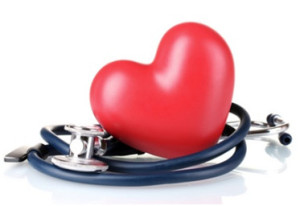Does Vitamin E Reduce Heart Attack Risk?
Author: Dr. Stephen Chaney
 Since February is “Heart Health Month”, I thought I would share some information with you that might change how you think about vitamin E and heart disease risk. You’ve seen the headlines: “Vitamin E Does Not Reduce the Risk of Heart Disease”. In fact, these headlines have been repeated so many times that virtually every expert thinks that it has to be true. Let me share the opinion of one expert who disagrees. This week I’m going to share some information with you that I learned from a seminar by Dr. Jeffrey Blumberg from Tufts University.
Since February is “Heart Health Month”, I thought I would share some information with you that might change how you think about vitamin E and heart disease risk. You’ve seen the headlines: “Vitamin E Does Not Reduce the Risk of Heart Disease”. In fact, these headlines have been repeated so many times that virtually every expert thinks that it has to be true. Let me share the opinion of one expert who disagrees. This week I’m going to share some information with you that I learned from a seminar by Dr. Jeffrey Blumberg from Tufts University.
But first let me tell you who Dr. Blumberg is. Dr. Blumberg is a Professor in the Friedman School of Nutrition Science and Policy at Tufts. Dr. Blumberg has over 200 publications in peer-reviewed scientific journals. He is considered one of the world’s top experts on supplementation.
Now back to what I learned at his seminar. Dr. Blumberg’s specialty is conducting and analyzing clinical studies, and his perspective on some very influential clinical studies is a bit different from what you may have heard from media reports. He believes that the media has seriously misinterpreted several recent studies. You might call this “The Rest of the Story” because you (and your doctor) definitely did not hear this part of the story in the news.
Does Vitamin E Reduce Heart Disease Risk In Women?
 Let’s start with vitamin E and the risk of cardiovascular disease in women. The most influential study on this subject was the Women’s Health Study (Lee et al., JAMA, 294:56-65, 2005). This was a major study in which 39,876 women were given either 600 IU of vitamin E every other day or a placebo and followed for 10 years.
Let’s start with vitamin E and the risk of cardiovascular disease in women. The most influential study on this subject was the Women’s Health Study (Lee et al., JAMA, 294:56-65, 2005). This was a major study in which 39,876 women were given either 600 IU of vitamin E every other day or a placebo and followed for 10 years.
The headlines said “Vitamin E Supplements Do Not Reduce Risk Of Cardiovascular Death, Heart Attack And Stroke In Women”. That was true if you looked at the total population of women in the study.
But Dr. Blumberg pointed out that when you looked at women who were 65 or older in that study vitamin E supplementation caused a…
- 24% decrease in cardiovascular deaths,
- 26% decrease in major cardiovascular events,
- 21% decrease in venous thromboembolism (blood clots forming in the veins),
…and all of these decreases were statistically highly significant. That’s important because the risk of heart disease in pre-menopausal women is extremely low. It’s the over 65 group who have a high risk of heart disease.
Perhaps the headlines should have said: “Vitamin E reduces the risk of cardiovascular disease and cardiovascular deaths in those women at high risk of heart attacks”. But, of course, they didn’t. Perhaps that wasn’t considered newsworthy.
Other Studies On Vitamin E and Heart Disease Risk In Women
 If this were the only study suggesting the vitamin E might benefit women at high risk of having a heart attack or stroke, it might be easy to dismiss it, but it’s not the only study showing this effect.
If this were the only study suggesting the vitamin E might benefit women at high risk of having a heart attack or stroke, it might be easy to dismiss it, but it’s not the only study showing this effect.
For example, a subsequent study called the “Women’s Antioxidant Cardiovascular Study” looked at the effect of 600 IU of vitamin E every other day on cardiovascular events in 8171 women health professionals (Cook et al, Archives of Internal Medicine, 167:1610-1618, 2007).
Once again the headlines said that vitamin E supplementation had no effect on cardiovascular events in women. But, when the authors looked at those women who already had cardiovascular disease at the beginning of the study (and were, therefore, at high risk of suffering a cardiovascular event during the study) vitamin E supplementation caused a 23% decreased risk of heart attack, stroke and cardiovascular death.
Another important study was the HOPE (Heart Outcomes Prevention Evaluation) study (Levy et al, Diabetes Care, 27: 2767, 2004). The overall study results were similar to several other recent trials – no significant effect of vitamin E supplementation on cardiovascular health in the population group as a whole.
However, by the time that study was performed it was clear that a particular genetic variation in the haptoglobin gene called the haptoglobin 2-2 genotype lead to a significant increase in oxidative damage to the vascular wall (the professor will collect your quizes at the end of this email).
When the data were reanalyzed by genotype, it became clear that people with the haptoglobin 2-2 genotype experienced a significant decrease in both heart attack and cardiovascular death with vitamin E supplementation. This finding has been confirmed by a subsequent double-blind, placebo-control study specifically designed to look at the cardioprotective effects of vitamin E in people with different haptoglobin genotypes (Milman et al, Arterioscler. Thromb. Vasc. Biol., 24: 136, 2008).
In short, the headlines from all three studies should have said: “Vitamin E reduces the risk of cardiovascular disease and cardiovascular deaths in those women at high risk of heart attacks” – and, it doesn’t appear to matter whether the increased risk is due to age, pre-existing disease, or genetic predisposition.
Does Vitamin E Reduce Heart Disease Risk In Men?
 For men the most influential study was called the “Physician’s Health Study II” (H. D. Sesso et al, JAMA, 300: 2123-2133, 2008). In this study male physicians aged 40-84 were invited to participate in a double-blind clinical trial in which they were randomly assigned into groups who were given 400 IU of vitamin E every other day or placebo. They were followed for an average of 8 years during which data on both total mortality and cardiovascular mortality were obtained.
For men the most influential study was called the “Physician’s Health Study II” (H. D. Sesso et al, JAMA, 300: 2123-2133, 2008). In this study male physicians aged 40-84 were invited to participate in a double-blind clinical trial in which they were randomly assigned into groups who were given 400 IU of vitamin E every other day or placebo. They were followed for an average of 8 years during which data on both total mortality and cardiovascular mortality were obtained.
Once again, the headlines read “Vitamin E Does NotPrevent Cardiovascular Disease in Men”. But let me tell you what Dr. Blumberg said so that you understand “The Rest of the Story”. It starts by looking at the selection process for the Physician Health Studies.
Dr. Sesso and his colleagues sent out a letter asking 261,248 male physicians in the US if they would be willing to participate in the study. Only 112,528 responded and, of those responding, only 59,272 indicated that they were willing to participate. Of those who said that they were willing to participate only 32,223 met the selection criteria.
The exclusion criteria eliminated anyone who already had suffered a heart attack, stroke, angina or was on a blood thinner – in other words those people who were at greatest risk of suffering a heart attack or stroke during the study.
Finally, the study had an 18 week “run in” period to eliminate those people who were unwilling or unable to comply with the study protocol. This eliminated another 10,000 participants, leaving only 22,071 participants – less than 10% of the original.
This is where it gets really interesting. Dr. Sesso and his colleagues used publicly available databases to evaluate total and cardiovascular mortality in each group (H. D. Sesso et al, Controlled Clinical Trials, 23: 686-702, 2002). It turns out that at each stage of the selection process the incidence of both total and cardiovascular mortality during the 8-year period decreased.
In fact, the doctors who were actually included in the study were 67% less likely to die from all causes and 73% less likely to die from cardiovascular disease than the male physician population as a whole.
The bottom line is that the selection process eliminated almost all of the physicians at significant risk of having a heart attack or stroke during the study. The only ones who were actually enrolled in the study were those physicians who were at very low risk for having a fatal heart attack or stroke – or dying from any cause – during the study.
So the headlines describing this study should have read “Vitamin E Does Not Prevent Cardiovascular Disease in Men Who Are At Very Low Risk Of Heart Attack And Stroke”.The irony is that there was nothing wrong with the design of the study. It’s probably just a male ego thing. Guys who were unhealthy just didn’t want to participate in a study that might show how unhealthy they really were.
What Does This Mean For You?
These studies illustrate the true story of supplementation. For those of us who are at low risk of disease, supplementation is just a form of health insurance. But for those of us at high risk of disease, supplementation can make a huge difference in our health. That increased risk can be due to many things, as we have seen in the studies above. It can be due to poor diet, age, pre-existing disease, and/or genetic predisposition.
The problem is that most of us don’t really know whether we are at low risk or high risk until it’s too late. For millions of Americans the first sign of heart disease is sudden death.
The Bottom Line
- The experts have been saying for years that vitamin E does not reduce the risk of heart disease. That claim is true, if you look at the general population, most of which is at low risk of developing heart disease – at least during the time frame of the clinical studies. However, when you look at people who are at high risk of developing heart disease, the answer is different.
- For example, when you look at clinical studies with women, vitamin E significantly decreased the risk of heart attacks in women who…
- Were over 65,
- Had pre-existing heart disease at the beginning of the study,
- Or, had a genetic predisposition to heart disease.
The headlines from these studies should have read “Vitamin E reduces the risk of cardiovascular disease in those women at high risk of heart attacks”, but they didn’t.
- For men the story is a bit different. The Physician’s Health Study is considered the definitive study on the subject. However, most of the unhealthy male physicians either didn’t enroll in the study or dropped out before its completion. In fact, the doctors who were actually included in the study were 67% less likely to die from all causes and 73% less likely to die from cardiovascular disease than the male physician population as a whole. The headlines describing this study should have read “Vitamin E Does Not Prevent Cardiovascular Disease in Men Who Are At Very Low Risk Of Heart Attack And Stroke”.
- These studies illustrate the true story of supplementation. For those of us who are at low risk of disease, supplementation is just a form of health insurance. But for those of us at high risk of disease, supplementation can make a huge difference in our health. That increased risk can be due to many things, as we have seen in the studies above. It can be due to poor diet, age, pre-existing disease, and/or genetic predisposition.
- The problem is that most of us don’t really know whether we are at low risk or high risk until it’s too late. For millions of Americans the first sign of heart disease is sudden death.
These statements have not been evaluated by the Food and Drug Administration. This information is not intended to diagnose, treat, cure or prevent any disease.
